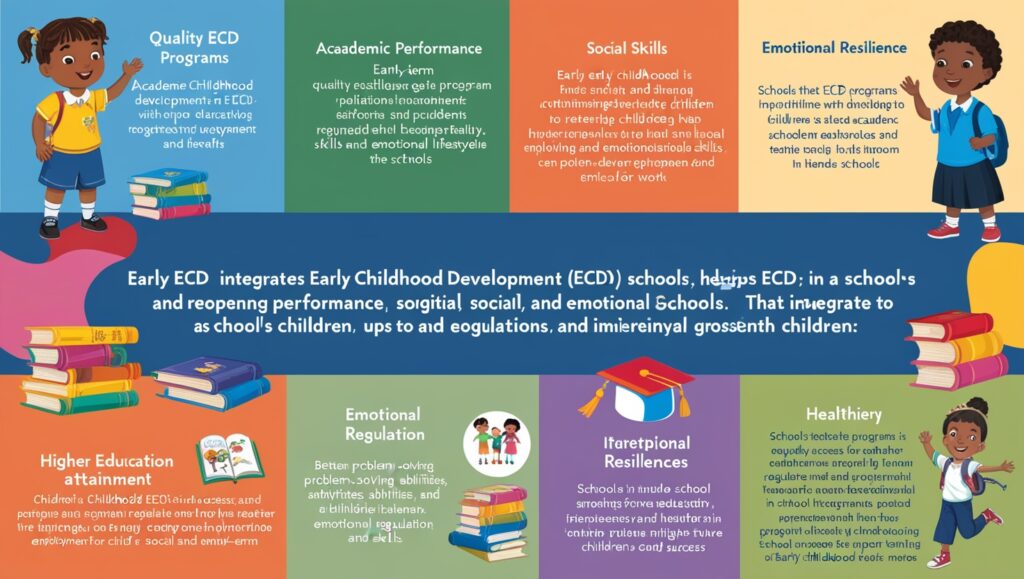Introduction
The Impact of Early Childhood Development (ECD) in Schools, Early Childhood Development (ECD) plays a critical role in shaping the cognitive, social, emotional, and physical growth of young children. It focuses on the period from birth to age eight, laying the foundation for lifelong learning, behavior, and overall well-being. Implementing ECD in schools has a profound impact on children, educators, and the broader community. This article explores how ECD affects students’ academic performance, social skills, emotional well-being, and long-term outcomes.
Cognitive and Academic Benefits
One of the most significant impacts of ECD in schools is its enhancement of cognitive development. According to research, early exposure to structured learning environments accelerates brain development, particularly in areas related to language, memory, and problem-solving. Children who participate in quality ECD programs tend to have higher IQs and improved academic performance in later years. ECD programs provide children with rich learning experiences that foster curiosity and cognitive flexibility.
In a school setting, ECD curriculums often incorporate activities that stimulate brain growth through play, storytelling, and hands-on learning. For example, teaching basic math and literacy skills in creative ways, such as through games or interactive stories, helps children grasp fundamental concepts more effectively. These early experiences make children more school-ready, reducing the gap between children from different socio-economic backgrounds when they enter formal schooling.
Moreover, studies show that children who attend ECD programs are more likely to excel academically throughout their school years. They are better at problem-solving and exhibit stronger critical thinking skills. Schools that implement strong ECD frameworks tend to report lower rates of grade repetition and special education placements, as these children enter school better equipped to meet academic challenges.
Social Development
ECD also significantly impacts social development. In early childhood, children learn to communicate, cooperate, and engage with others in structured and unstructured environments. Schools that emphasize ECD foster these interactions through activities that promote group play, team projects, and peer interaction. These experiences help children develop empathy, conflict resolution skills, and an understanding of social norms.
Socialization during early childhood in a school setting encourages children to work collaboratively with peers, improving their ability to form relationships and navigate social situations. Children who attend quality ECD programs demonstrate better emotional regulation and interpersonal skills, which are crucial for adapting to the social demands of school life. They are more likely to follow classroom rules, show respect for authority figures, and engage positively with their peers.
In schools, ECD programs that incorporate social-emotional learning (SEL) help children develop the ability to manage their emotions, build relationships, and make responsible decisions. SEL programs are increasingly being recognized for their role in improving students’ overall well-being and academic success. Early intervention in this area reduces behavioral problems and encourages the development of a positive self-image and greater resilience in the face of challenges.

Emotional and Psychological Impact
The emotional development fostered through ECD is equally important. Emotional well-being in early childhood is linked to long-term mental health. Schools that integrate ECD programs often provide safe and nurturing environments where children can explore their emotions and learn to express them appropriately. Teachers trained in early childhood education understand the importance of creating emotionally supportive classrooms that allow children to build secure attachments with adults and peers.
Children who participate in ECD programs tend to have better emotional self-regulation and lower levels of anxiety and depression as they grow older. By learning to recognize and label their emotions, they can better cope with stress and develop healthier coping mechanisms. Furthermore, emotional intelligence gained during early childhood helps children navigate the challenges of school, such as handling disappointment or managing conflicts with classmates.
School-based ECD programs that emphasize emotional literacy equip children with the skills to identify their feelings, understand others’ emotions, and react appropriately in social contexts. This emotional foundation contributes to a child’s sense of security and overall mental health, which is critical for success in later stages of schooling and life.
Long-term Benefits
The long-term benefits of ECD in schools extend beyond academic success and social competence. Research has shown that early childhood education is one of the most effective ways to break the cycle of poverty. Children from disadvantaged backgrounds who participate in quality ECD programs are more likely to graduate from high school, pursue higher education, and gain stable employment. These children are also less likely to engage in criminal activities or require welfare assistance in adulthood.
A comprehensive ECD program in schools can also help identify learning disabilities and developmental delays early on. Schools that incorporate ECD into their curricula are better equipped to provide individualized learning experiences that cater to the diverse needs of all students.
Furthermore, ECD programs have been shown to improve life skills such as perseverance, time management, and goal-setting, which are essential for success in both academic and personal life. Children who experience quality ECD are more likely to become responsible citizens who contribute positively to society. Studies have also linked early childhood education to improved health outcomes, as children who attend ECD programs tend to engage in healthier behaviors, such as better nutrition and exercise habits, which lead to a reduced risk of chronic illnesses later in life.
Challenges and Considerations
While the benefits of ECD in schools are well-documented, there are challenges to its successful implementation. One of the major hurdles is ensuring equitable access to quality ECD programs, particularly in under-resourced communities. Schools in these areas may lack the funding, infrastructure, or trained educators necessary to provide high-quality early childhood education.
Another challenge is aligning ECD programs with the cultural values and needs of diverse populations. Schools must ensure that their ECD programs are inclusive and culturally responsive, recognizing the unique backgrounds and experiences of each child. Furthermore, the success of ECD programs depends on the involvement of families. Schools need to engage parents and caregivers as partners in the educational process, as early learning extends beyond the classroom.
Teacher training is also a critical factor. Educators working with young children need specialized training to understand the developmental stages of early childhood and how to create learning environments that are both stimulating and supportive. Schools that invest in continuous professional development for teachers are better positioned to deliver high-quality ECD programs.
Conclusion
The impact of Early Childhood Development (ECD) in schools is profound and far-reaching. It not only enhances cognitive development and academic readiness but also plays a crucial role in shaping children’s social, emotional, and psychological growth. By investing in ECD, schools set the foundation for children to thrive academically, socially, and emotionally throughout their lives. However, to fully realize these benefits, it is essential to address the challenges of access, equity, and quality in ECD programs. As research continues to highlight the critical importance of early childhood education, schools and policymakers must prioritize the expansion and improvement of ECD initiatives to ensure that all children have the opportunity to reach their full potential.
References
- Heckman, J. J. (2011). The Economics of Inequality: The Value of Early Childhood Education. American Educator.
- Shonkoff, J. P., & Phillips, D. A. (2000). From Neurons to Neighborhoods: The Science of Early Childhood Development. National Academy Press.
- Yoshikawa, H., et al. (2013). Investing in Our Future: The Evidence Base on Preschool Education. Society for Research in Child Development.
- Barnett, W. S. (2008). Preschool Education and Its Lasting Effects: Research and Policy Implications. National Institute for Early Education Research.

8 thoughts on “The Impact of Early Childhood Development (ECD) in Schools”
Comments are closed.